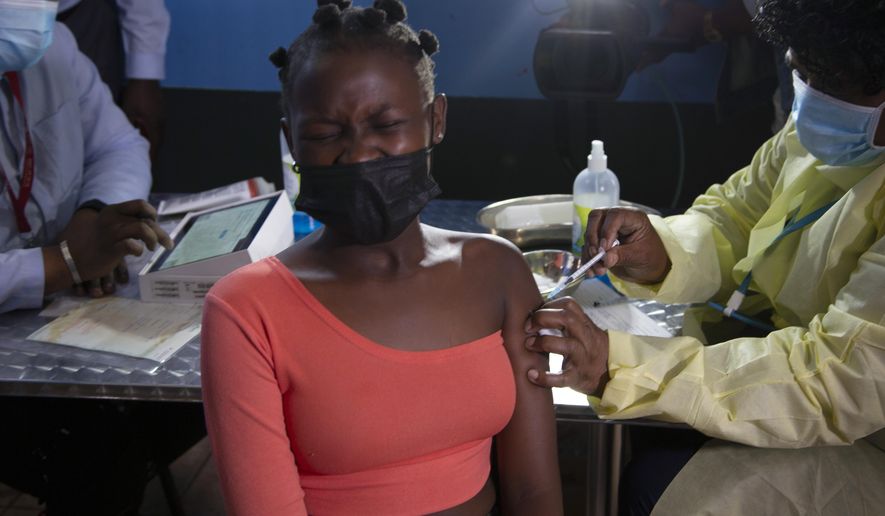The World Health Organization will meet Friday to discuss what an alarming coronavirus variant with a “large number of mutations” could mean for COVID-19 vaccines and treatments as European countries started to ban flights from South Africa and surrounding nations.
The variant known as B.1.1.529 was detected in small numbers in Johannesburg, South Africa, and nearby nations, but the globe has been burned by variants before, notably delta, and cannot afford a setback in the pandemic fight. Hong Kong detected two cases of the variant and Belgium reported one, making it the first in Europe.
“We don’t know very much about this yet. What we do know is that this variant has a large number of mutations. And the concern is that when you have so many mutations, it can have an impact on how the virus behaves,” Dr. Maria Van Kerkhove, the WHO‘s technical lead for COVID-19, said in a social media Q&A. “So right now, researchers are getting together to understand where these mutations are and what that potentially may mean for our diagnostics, our therapeutics and vaccines.”
Professor Tulio de Oliveira, the director of the Center for Epidemic Response and Innovation in Africa, said in a news briefing Thursday the variant has “many more mutations than we have expected,” including more than 30 in the spike protein the virus uses to hack into human cells.
He said it is “spreading very fast and, we expect to see pressure in the health system in the next few days and weeks.”
WHO will decide if the mutations amount to a variant of interest or concern and possibly assign it a Greek name.
SEE ALSO: Stocks sink on new COVID variant; Dow loses 905 points
Dr. Anthony Fauci, director of the National Institute of Allergy and Infectious Diseases, said U.S. scientists would discuss the variant with South African counterparts Friday. He said the variant appeared to proliferate in South Africa over the past few days.
“It’s in a fluid motion. We’re finding [out] more about it, and literally, it’s something in real-time we’re learning more and more about,” he told CNN.
He said it is technically possible the variant made its way to the U.S., but there are no documented cases yet. Dr. Fauci said U.S. officials will put together the materials they need to test for the variant and decide whether to restrict travel.
“You always put these things on the table but you don’t want to say you are going to do it until you have a scientific reason to do it,” he said. “That’s the reason why we’re rushing now to get that scientific data to try and make an informed decision about something like that.”
Other countries said they weren’t taking any chances.
The European Commission “will propose, in close coordination with member states, to activate the emergency brake to stop air travel from the southern African region due to the variant of concern B.1.1.529,” Commission President Ursula von der Leyen tweeted Friday.
Europe is struggling with another wave of the virus and protests over economic restrictions.
British Health Secretary Sajid Javid said flights from six African countries — South Africa, Lesotho, Botswana, Namibia, Eswatini and Zimbabwe — would be temporarily banned as of noon Friday, and returning U.K. travelers must quarantine.
“This new variant is of huge international concern,” Mr. Javid told Parliament. “This is a fast-moving situation and there remains a high degree of uncertainty.”
South Africa‘s government criticized the decision on Friday.
“The UK’s decision to temporarily ban South Africans from entering the UK seems to have been rushed as even the World Health Organization is yet to advise on the next steps,” the Minister of International Relations and Cooperation said.
Mr. Javid praised South Africa for its transparency around the new variant but said the U.K. couldn’t take risks.
“We are concerned that this new variant may pose a substantial risk to public health. The variant has an unusually large number of mutations,” he said. “Earlier indications show this variant may be more transmissible than the delta variant and current vaccines may be less effective against it.”
“One of the lessons of this pandemic has been that we must move quickly and at the earliest possible moment,” Mr. Javid said.
An aggressive variant known as “beta” emerged in South Africa earlier in the pandemic and spread worldwide. Then, the delta variant first detected in India swept around the world and produced a major setback in the U.S. fight against the virus in late summer.
For more information, visit The Washington Times COVID-19 resource page.
• Tom Howell Jr. can be reached at thowell@washingtontimes.com.




Please read our comment policy before commenting.